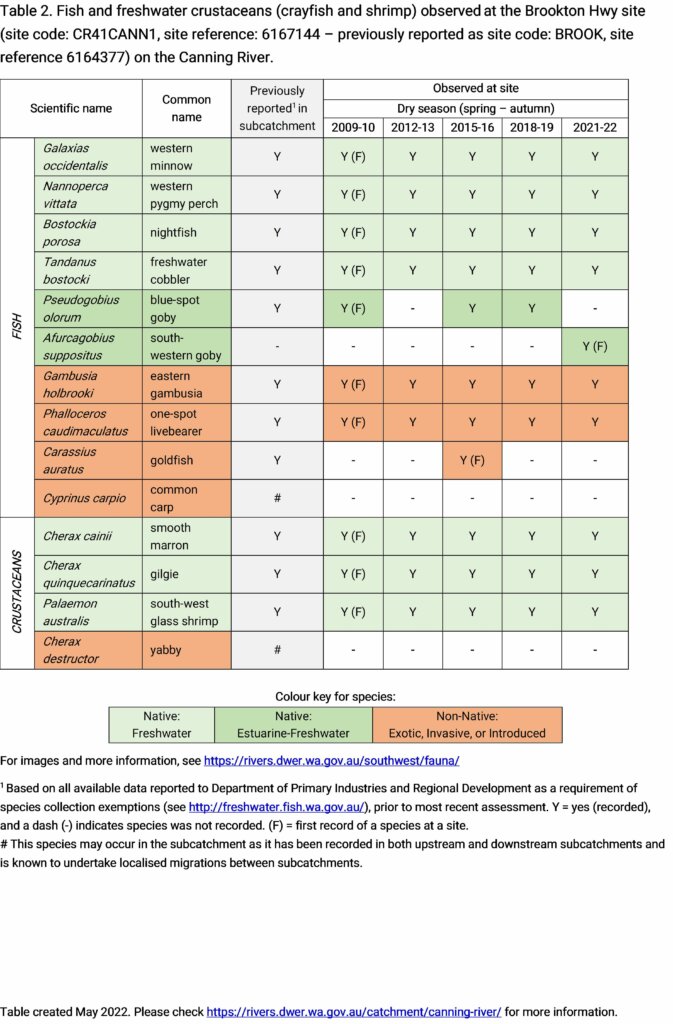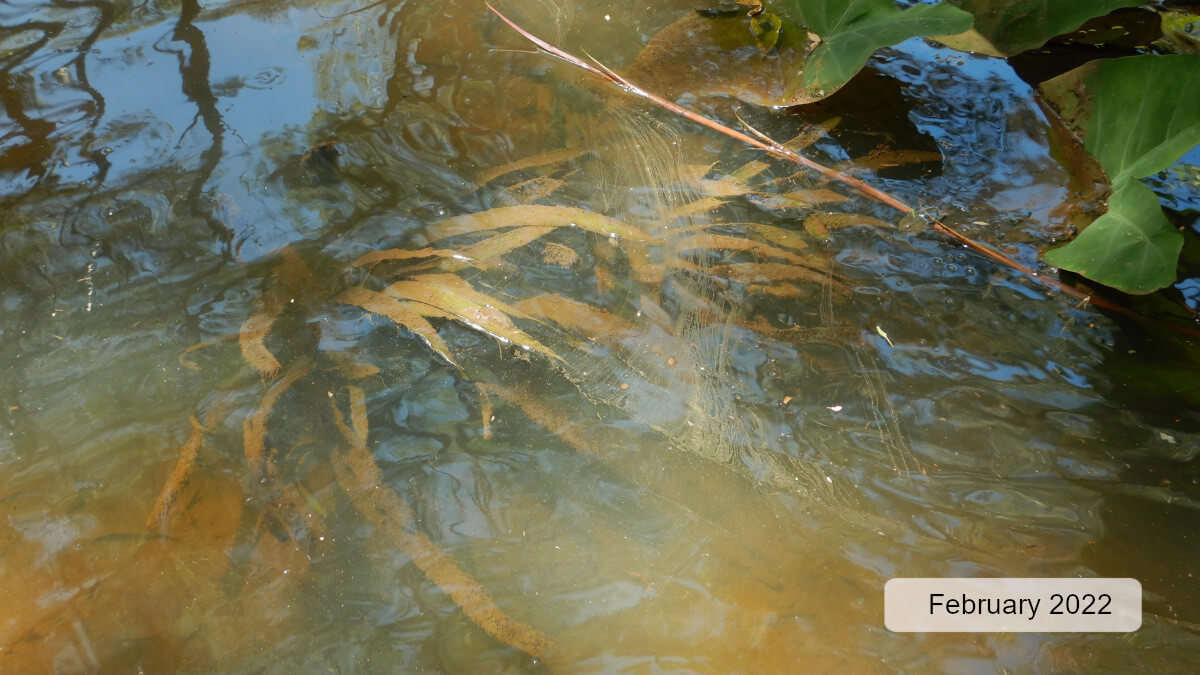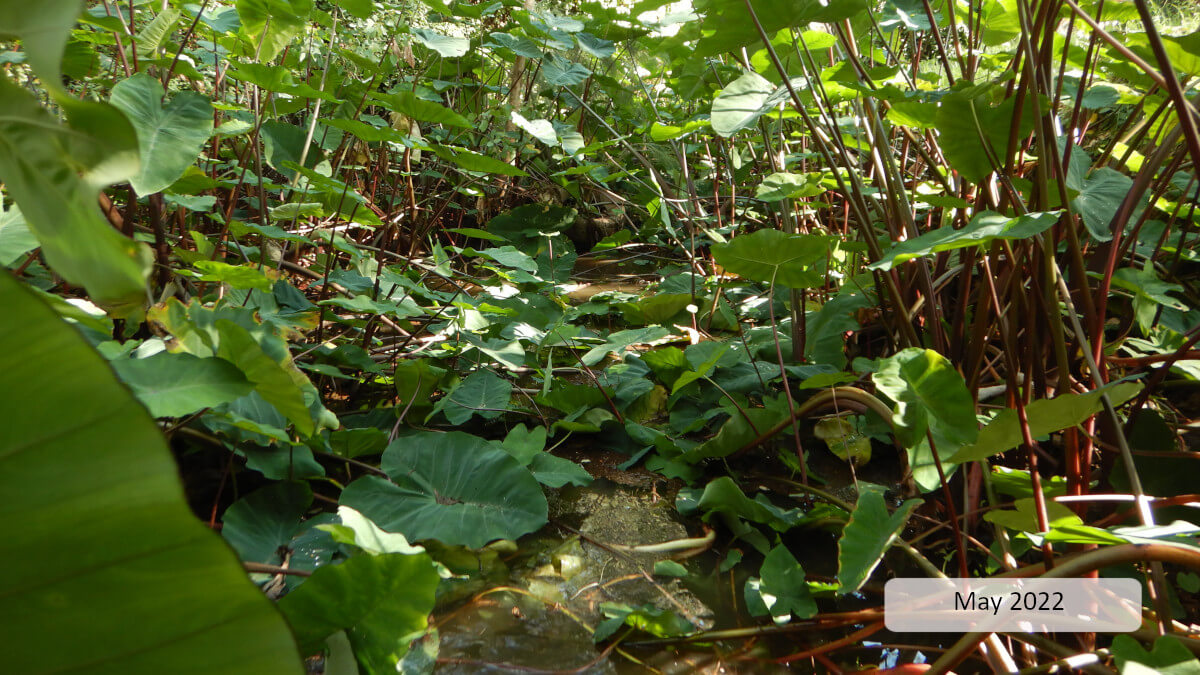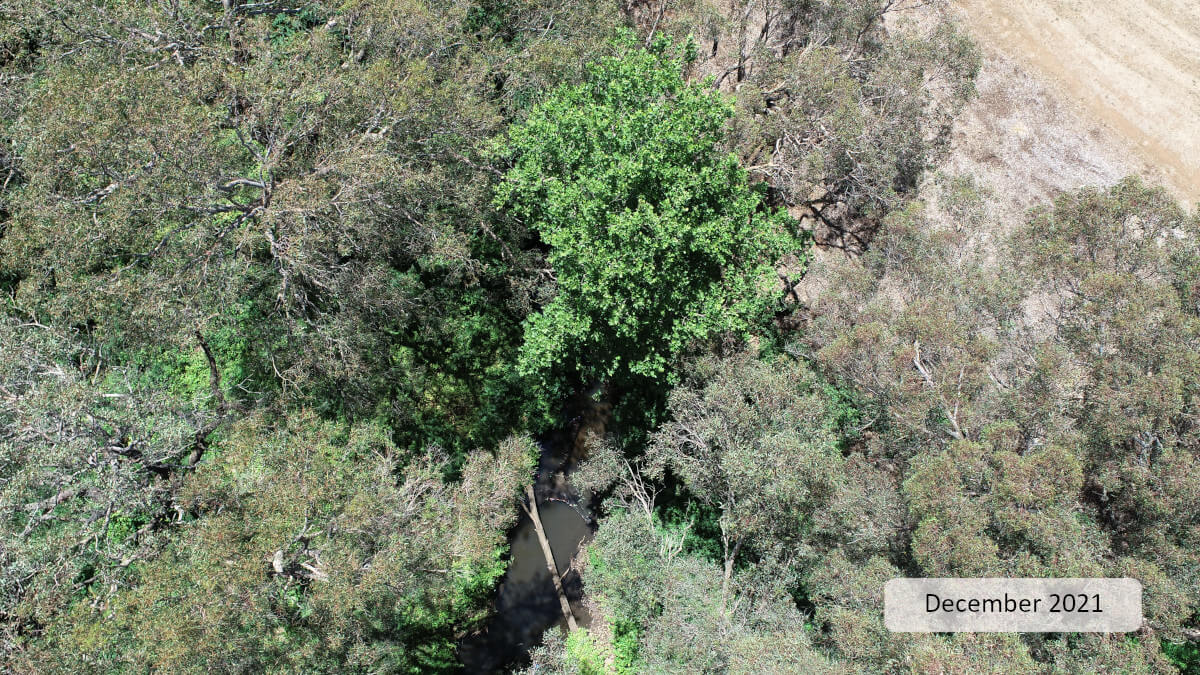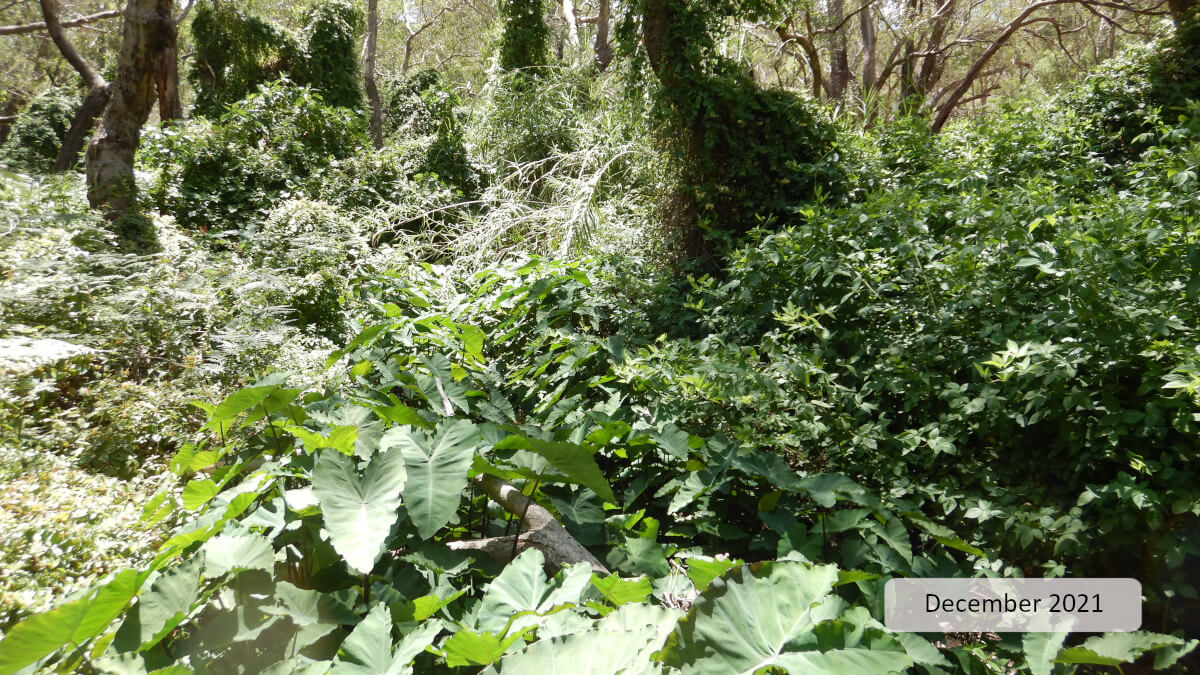
Canning River - Brookton Highway
Basin : Swan-Coastal
Catchment : Canning River
River condition at the Brookton Highway site on the Canning River (site code: CR41CANN1, site reference: 6167144 ‒ previously reported as site code: BROOK, site reference: 6164377) has been assessed on several occasions since 2009. This includes 18 individual fish and crayfish surveys as part of the Healthy Rivers program, including previous versions of the program. Most recently it was assessed three times over the dry season of 2021–22 (during December 2021 and February and May 2022). Additionally, water quality was logged at 30-minute intervals between November 2021 and May 2022.
Healthy Rivers assessments are conducted using standard methods from the South West Index of River Condition (SWIRC), which incorporates field and desktop data from the site and from the broader catchment. Field data collected include the following indicators, assessed over about a 100 m length of stream:
- Aquatic biota: fish and crayfish community information (abundance of native and exotic species across size classes, general reproductive and physical condition)
- Water quality: dissolved oxygen, temperature, specific conductivity, and pH (logged in situ over 24 hours) as well as laboratory samples for colour, alkalinity, turbidity and nutrients
- Aquatic habitat: e.g. water depth, substrate type, presence of woody debris and detritus, type and cover of macrophytes and draping vegetation
- Physical form: channel morphology, bank slope and shape, bioconnectivity (barriers to migration of aquatic species), erosion and sedimentation
- Fringing zone: width and length of vegetation cover within the river corridor and lands immediately adjacent, structural intactness of riparian and streamside vegetation
- Hydrology: measures of flow (velocity) at representative locations (compared against data from stream gauging stations within the system)
- Local land use: descriptions of local land use types and activities (compared against land use mapping information for the catchment)
Previous assessments at this site are listed below and include some or all of the measures above. Note: aquatic fauna sampling methods have been specified given variations between surveys.
| Year | Period | Author | Assessment |
|---|---|---|---|
| 2009–10 | Nov–Apr | Water Science Technical Series, Report no. 35, Department of Water, Government of Western Australia, Perth | 6 x monthly fish and crayfish trapping over 72 hours |
| 2012–13 | Dec–Apr | Department of Water | 3 x bimonthly fish and crayfish trapping over 24 hours |
| 2015–16 | Nov–May | Healthy Rivers (Department of Water) | Full SWIRC assessment (SWIRC method) – Dec 2015 Fish and crayfish trapping only – Feb and Apr 2016 |
| 2018–19 | Nov–Apr | Healthy Rivers (Murdoch University for Department of Water and Environmental Regulation) | Full SWIRC assessment (SWIRC method) – Dec 2018 Fish and crayfish trapping only – Feb and Apr 2019 Mussel survey Dec 2018 and Feb 2019 |
| 2021–22 | Nov–May | Healthy Rivers (Department of Water and Environmental Regulation) | Full SWIRC assessment (SWIRC method) – Dec 2021 Fish and crayfish trapping only – Feb and May 2022 |
For a subset of the assessments above, water quality loggers were deployed for extended periods (see below). This enabled assessment of water quality responses to changes in climate, streamflow and factors such as the intactness of vegetation within the river corridor. Among other things, this allows detection of suboptimal water quality conditions which can be missed during the standard 24-hour assessment.
- 2015–2016 (Nov–May): Healthy Rivers
- 2018–2019 (Nov–Apr): Healthy Rivers
- 2021–2022 (Nov–May): Healthy Rivers
Other departmental data: The Brookton Highway site is about 5 km upstream of the Department of Water and Environmental Regulation’s (the department) flow gauging station known as Seaforth (site reference 616027), which has been in operation since 1997.
Search the site code or site reference in the department's Water Information Reporting (WIR) system to find data for this site and nearby sampling points (flows, surface water quality, groundwater monitoring, the department's meteorological data). See also the Bureau of Meteorology website for additional meteorological data for the area.
Condition summary
A report from the 2009–10 sampling is available on the department’s website.
The image below indicates the conditions at the Brookton Highway site in January 2022. January is within the Noongar season of Birak (first summer), which is a season marked by decreasing rainfall and increasing temperatures. Further images are provided in the gallery at the bottom of the page to show general site conditions.
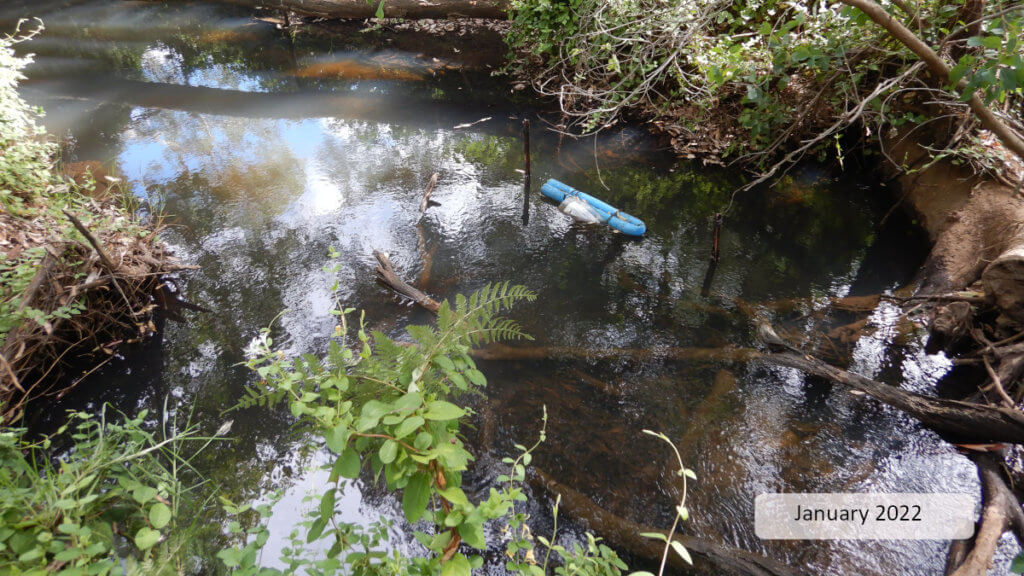
A summary of aquatic biota detected over the different sampling events, and water quality over the latest monitoring period, is provided in the sections below. For other site data, please contact the department’s River Science team (please reference the site code and sampling dates).
Flow & connectivity
Scheme water is released from six points along the Canning River over the dry season (about November to May) to maintain key ecological function, provide water for licensed use, and contribute to maintaining the cultural and social values of the river.
These Environmental Water Provisions were formalised in the Middle Canning River surface water allocation plan (2012) and are set out in the Water Resource Management Operating Strategy associated with Water Corporation’s licence for the Integrated Water Supply Scheme. The allocation plan is evaluated and updated as required.
Regarding river health, the release regime was designed to support pool ecology through maintenance of water quality and habitat availability, including providing for localised movement of aquatic fauna. This follows guidance from the Ecological Water Requirements for the Lower Canning River (2010) and has been adapted over time following recommendations from ecological monitoring undertaken as part of the allocation plan evaluation.
Flow data are provided in the next section.
Water quality
Continuous water quality data collected between November 2021 and May 2022 are displayed below.
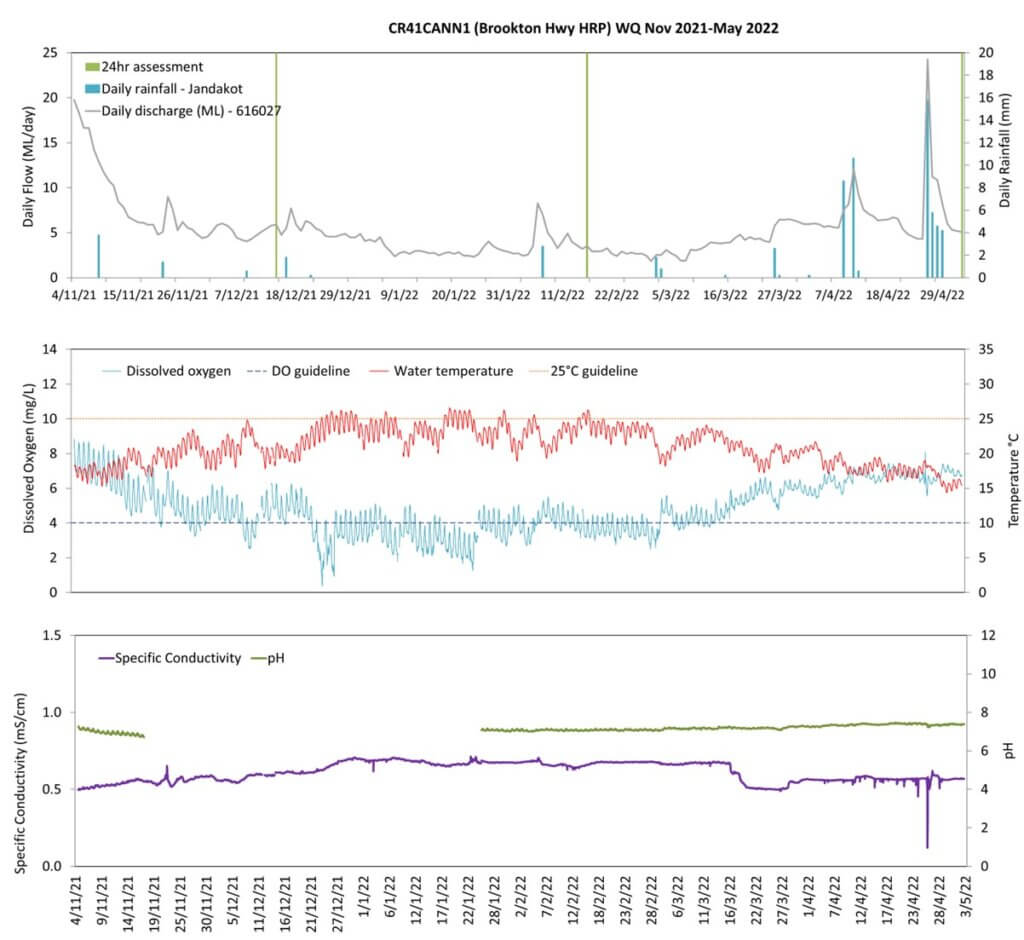
Maximum water temperature remained below 25°C for most (94 per cent) of the assessment period, with only minor exceedances of a short duration, between November and May. We use the 25°C threshold1 as the upper range for optimal conditions, with stress to aquatic fauna expected to increase as levels rise further above 25°C. Maintaining optimal temperatures despite high ambient temperatures recorded during the period (Jandakot airport maximum was 39.6°C on 21 January 2022) is presumably because of extensive shading from the tree canopy at the site.
Dissolved oxygen was below the 4 mg/L threshold2 for 32 per cent of the assessment period and was below 2 mg/L for 1.3 per cent of that time. The period of lowest dissolved oxygen was recorded during January and February when air and water temperatures were highest, and flows were at their lowest. The diurnal flux in dissolved oxygen was relatively small, indicating a natural pattern of dissolved oxygen in water that was not overly influenced by biological drivers (e.g. algae and bacteria). The dissolved oxygen conditions are not uncharacteristic of many south-west streams at this time of the year and are not expected to have a significant impact to fauna (particularly as areas of higher oxygen are expected to occur elsewhere at the site). This assumption is supported by fauna collections, described later in this summary.
Specific conductivity and pH remained within acceptable ranges, based on expectations of natural ranges for freshwater rivers of south-west Western Australia.
Footnote:
1 An upper limit for temperature is nominally set at 25°C based on the range recorded in sites where south-west native fish species are typically found to occur (Beatty et al. 2013).
2 A threshold value of 4 mg/L is taken from the SWIRC where it is used as a guideline limit for condition scoring. This level aligns with Beatty et al. (2013) where south-west native fish species were shown to typically reside in sites with levels above 4 mg/L.
Species found in subcatchment
Native Species
- Blue-spot gobyPseudogobius olorum
- Carter's freshwater musselWestralunio carteri
- Freshwater cobblerTandanus bostocki
- GilgieCherax quinquecarinatus
- NightfishBostockia porosa
- Rakali - water ratHydromys chrysogaster
- Smooth marronCherax cainii
- South-west glass shrimpPalaemon australis
- South-western gobyAfurcagobius suppositus
- South-western snake-necked turtleChelodina colliei
- Western minnowGalaxias occidentalis
- Western pygmy perchNannoperca vittata
Species found at the site
Fish and crayfish
The species captured at the Brookton Hwy site during each of the sampling periods since 2009–10 are provided in Table 2. The table includes a list of all species previously reported in the subcatchment, which provides an indication of species that may occur at the assessment site. As differences in habitat within a subcatchment naturally influence species distributions, and variability in methods between sampling programs can affect the species caught, this list is only indicative.
Seven species of fish and two species of crustacean were recorded during the 2021–22 sampling. This included five native, endemic fish species (freshwater cobbler, western minnow, western pygmy perch, nightfish and south-western goby) and two endemic freshwater crayfish (smooth marron and gilgie). Two exotic fish species were also recorded, eastern gambusia and one-spot livebearer.
The three small-bodied native freshwater fish (western minnow, western pygmy perch and nightfish), and the large-bodied native freshwater cobbler, have been observed during all assessed periods since 2009–10. Both of the commonly found crayfish species (smooth marron and gilgie) have also both been present during all assessments since 2009–10.
During the 2021–22 assessments the western minnow was most abundant with about one-third of individuals being juveniles, suggesting a healthy population. Western pygmy perch and nightfish were less abundant and no juveniles were recorded for either species. The freshwater cobbler was also relatively abundant across the three fish surveys in 2021–22 and about one-quarter of individuals were juveniles. The large size of cobbler (relative to all other native fish) and requirement for movement within the system through the dry season provides a good indication that bioconnectivity is being maintained.
The low number and lack of juvenile pygmy perch and nightfish is not of immediate concern as water quality and habitat conditions did not indicate any threats to life histories of either species (supported by recruitment of other species). Also, results can be explained based on the site not being close to nursery areas for these species, which is supported by the presence of juveniles at the upstream Stocker Road site. Notwithstanding, age distribution of populations will continue to be monitored to ensure successful recruitment is being achieved.
Gilgies were more abundant than smooth marron, and juveniles were only recorded for gilgies.
The two exotic fish species were abundant, and juveniles were recorded for both. This would suggest their populations are well established and thus pose an ongoing threat to native fish species (through competition and direct aggressive behaviours).
Note: collection of fauna from inland aquatic ecosystems across Western Australia requires a licence from the Department of Primary Industries and Regional Development (DPIRD) and the Department of Biodiversity, Conservation and Attractions (DBCA). All species collected must be reported to these agencies as part of licence conditions.
Other aquatic fauna
Carter’s freshwater mussel (Westralunio carteri) was observed at the Brookton Hwy site during the 2021–22 assessments. This mollusc is the sole endemic freshwater mussel species in Western Australia and currently listed as vulnerable on the International Union for Conservation of Nature’s (IUCN) red list of threatened species (because of declining range, which is largely attributed to the effects of salinity).
Although not targeted by collection methods south-western snake-necked turtles (Chelodina oblonga) were collected in fish nets and/or traps.
Evidence of rakali (Hydromys chrysogaster) activity was also recorded (holes in nets and neatly incised and consumed crayfish tails). This species is listed by DBCA as a Priority 4 species (rare, near threatened and other species in need of monitoring).
For more information on these and other aquatic species, please see the River Science fauna page.
References & recommended reading
Explore other sites in the catchment
- 31 Mile Creek
- Bannister Creek - Bywood Way
- Bannister Creek - Upstream Hybanthus Road
- Bannister Creek - Upstream Iveston Road
- Bannister Creek - Upstream Metcalf Road
- Bickley Brook - Canning River confluence
- Bickley Brook - Davison Road
- Bickley Brook - Eva Street Downstream
- Bickley Brook - Eva Street Upstream
- Bickley Brook - Kenwick Link
- Bickley Brook - Mandarin Road
- Bickley Brook - Upstream BICKBK01A
- Bickley Brook - Upstream Mandarin Road
- Bull Creek - Upstream Corthinian Road
- Canning River - Civic Gardens
- Canning River - Corner Pool
- Canning River - Hester Park
- Canning River - Kent St Weir Downstream
- Canning River - Kent St Weir Upstream
- Canning River - Lissiman Street
- Canning River - McNess Drive
- Canning River - Odell Street
- Canning River - Powerline Pool
- Canning River - Seaforth
- Canning River - Stocker Road
- Canning River - Tributary
- Mill Street Main Drain - Palm Place
- Southern River
- Southern River - Shearwater Way
- Woodlupine Brook Branch Drain
- Wungong Brook - Bruns Drive
- Wungong Brook - South Western Highway
- Wungong River - Wattledale Road
- Wungong River - WUNGRIV01
- Wungong River - WUNGRIV01A
- Wungong River - WUNGRIV05
- Wungong River - WUNGRIV05A
- Yule Brook
